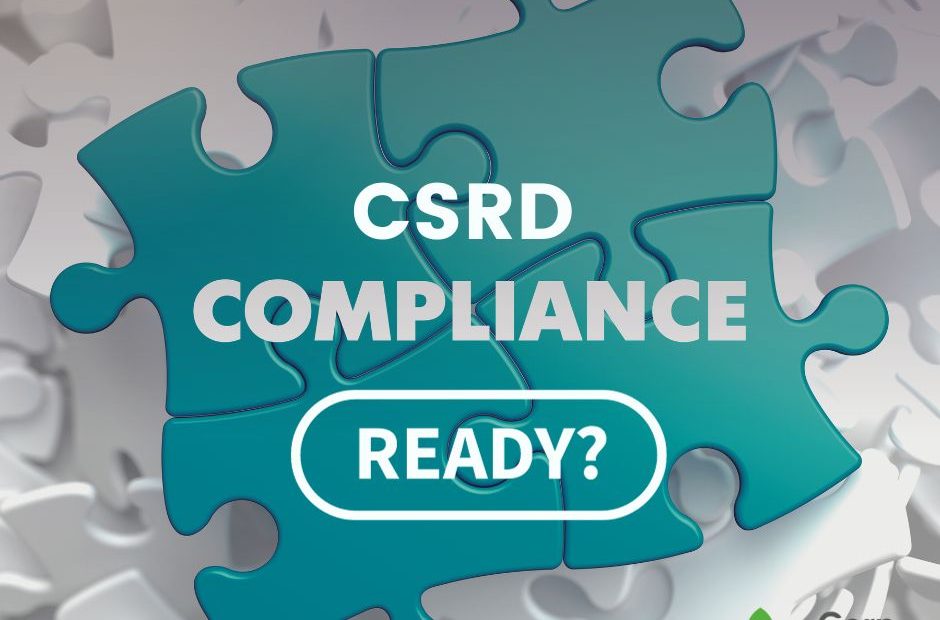Are you feeling the burden of CSRD compliance?
Introduction
As the world grapples with the need for sustainability and environmental responsibility the Corporate Sustainability Reporting Directive (CSRD) in Europe emerges as a milestone. The CSRD is set to become mandatory for a number of companies, both European and non-European bringing changes to sustainability reporting. This directive represents a shift in perspective by incorporating the economy into its reporting framework and aims to redefine standards for how companies disclose their environmental impacts.
Although primarily an initiative within Europe the implications of the CSRD extend beyond its borders, impacting business leaders in the other parts of the world. It becomes crucial for them to determine if they fall under this directive’s jurisdiction. For those that do- taking action is imperative. Failing to do the same could have consequences such as financial penalties, exclusion from investor portfolios damage to reputation and potential limitations on trading with the European Union (EU) if widespread non-compliance occurs. The specific sanctions will be determined by each territory when they transpose the CSRD into law.
In this article, we will explore the scope of the CSRD its impact, on businesses and stress why it is critically important to prepare for compliance. We will also introduce Corpstage, which’s a system created to support sustainability and ESG management. It provides assistance, to businesses as they navigate the landscape of CSRD compliance.
The CSRD expands on the existing Non-Reporting Directive (NFRD). Significantly increases the number of companies required to report on sustainability. Under the CSRD 50,000 European and non-European companies will now be obligated to report a rise from the 11,000+ companies covered by the NFRD.
Businesses in Asia Pacific that will be impacted by the CSRD include;
- Single entities listed on an EU regulated market through debt or equity.
- Large single entities based in the EU that meet two out of three criteria over two financial years;
a. Employing than 250 individuals.
b. Having a balance sheet total exceeding EUR€20 million.
c. Generating net turnover exceeding EUR€40 million. - Non-EU companies with an EU subsidiary or branch meeting criteria. Generating a net turnover of over EUR€150 million, in the EU over the past two consecutive financial years.
While reporting under CSRD also applies to EU issuers there remain several unresolved questions that require further clarification.
Implementation Timeline
In 2024; Entities that were already subject, to the NFRD must report on their year of 2024 in 2025.
In 2025; Companies that were not previously under the scope of the NFRD must report on their year of 2025 in 2026.
In 2028; Non EU companies will start reporting on their year of 2028 in 2029.
The implementation of the CSRD, which was adopted by the European Commission in 2022 will be rolled out gradually between 2024 and 2028. This means that different businesses will need to ensure CSRD compliance according to the timeline;
A Broad Scope
The CSRD introduces reporting requirements that cover aspects of sustainability. These encompass sustainability governance, strategy, impact assessment, risk and opportunity management, metrics and targets as considering a business impact on people and the environment through its supply chain – known as “double materiality.” Moreover, multiple reporting categories are introduced under the CSRD, including economy, climate change, pollution, water and marine resources, biodiversity and workforce.
Climate change reporting along with aspects of workforce reporting are obligatory, for all companies affected by the CSRD. However, for reporting categories a materiality assessment is required to determine if reporting is necessary. These assessments can be intricate since they involve analysing data points. For instance, when evaluating the circular economy category one of the factors to consider is the assessment of resource inflows and outflows, as optimizing resources and managing waste.
Although initially meeting the minimum requirements for CSRD compliance may seem achievable it comes with its set of risks. This is because reporting standards are expected to become more stringent over time. Governments and businesses worldwide are increasingly adopting policies that promote circularity highlighting the need for planning in order to address evolving risks and seize opportunities. Many large multinational corporations have already begun implementing strategies focused on circularity, which serves as an example for others to follow suit.
Taking action is crucial when dealing with changes.
Complying with CSRD regulations can be intricate and organizations face challenges in terms of assessing and reporting their sustainability practices. The level of detail required for the circular economy category often goes beyond what existing sustainability reports offer. With a preparation period that spans 18 to 30 months organizations must act promptly to ensure their data, personnel, technology, policies and processes are adequately prepared. Embracing transformation within the reporting ecosystem becomes essential in order to gain an understanding of risks, impacts and opportunities. This transformation plays a role in reporting and aligning businesses with principles that drive the circular economy.
Corpstage; Your Trusted Partner in CSRD Reporting
In this evolving landscape of sustainability reporting requirements Corpstage emerges as a platform, for businesses embarking on their CSRD compliance journey. We provide a service called CSRD Readiness & Reporting Consulting Services that aims to simplify compliance and maximize the benefits it brings.
Here are some potential advantages of utilizing Corpstage’s approach to CSRD;
- CSRD Readiness Assessment and Identifying Gaps
Our sustainability consultants guide organizations through a step-by-step assessment process to evaluate their status regarding CSRD compliance. By analysing existing sustainability roadmaps, governance structures and reporting procedures against CSRD requirements we help companies gain an understanding of their readiness level and identify resource needs. We have developed a CSRD Readiness Tool to assess companies status Quo on where they are in terms of their reporting and how much they need to go further and make changes. - Double Materiality Assessment- We not only focus on non-financial outcomes but also on financial outcomes of initiatives taken by companies in sustainability and ESG practices. Our platform provides a feasibility tool for companies to work out their financial and strategic ROIs before taking initiatives.
- Risk and Opportunity Assessment- We integrate TCFD recommendations in our consulting approach. We encourage companies to integrate climate related risks and opportunities with their ERM. Our platform allows them to do this integration.
- Setting ESG Targets; We assist in defining ESG targets and selecting metrics to meet both future regulatory requirements. Companies can then seamlessly monitor and track those KPIs. Corpstage assists in prioritizing areas that require attention based on identified gaps. Our experts provide support in implementing requirements and metrics like ESRS E1 Climate Change. We facilitate the quantification of emissions across the value chain (Scope 1 2 and 3) to establish emissions baselines while helping businesses develop reduction targets.
- Understanding the Impact of ESG; We help businesses understand how ESG factors influence their operations showcasing how adopting a net zero people friendly business model can offer an edge.
- Cross functional Governance; Corpstage aids, in establishing a functional governance structure for collecting, reporting and approving ESG data. We have in built approval mechanisms to ensure this governance.
- Managing ESG Data; We guide companies in investing in processes and controls for managing their ESG data.
- Assurance Preparation; As mandatory limited assurance of ESG reports becomes a part of CSRD compliance Corpstage equips businesses with the tools for effective preparation. Our upload feature for evidence uploads allows for easy verification.
- Leveraging Expertise and Software for CSRD Reporting : Preparation for mandatory sustainability reporting involves comprehensive data capture, digitization efforts, as well as third party assurance. At Corpstage we rely on both our expertise in this field along with software solutions to drive your success, in CSRD reporting. Corpstage’s Sustainability software simplifies the process of collecting and managing ESG data ensuring reporting that aligns, with CSRD regulations.
Why Choose Corpstage?
With the introduction of CSRD and the European Sustainability Reporting Standards (ESRS) the EU is emphasizing the importance of ESG reporting in companies’ day to day operations. Failure to comply can result in penalties, damage to reputation and trade limitations. By integrating ESG related risks and opportunities into their strategies businesses can lay a foundation, for transformation and success. However, meeting the requirements of CSRD can be an endeavour as it demands expertise, resources and reliable reporting tools that can scale and centralize the process.
At Corpstage, our team of sustainability and ESG experts is well equipped to tackle CSRD challenges using a project approach. With, over a decade of consulting experience in sustainability and ESG along with our own software solutions we offer support.
Corpstage is a trusted partner that offers the expertise and solutions required to achieve ESG compliance. By utilizing Corpstage’s Readiness & Reporting Consulting Services businesses can not only meet requirements but also gain a competitive advantage in an increasingly sustainability focused world. The time to take action is now. Corpstage is here to support you on your journey, towards a successful future.









